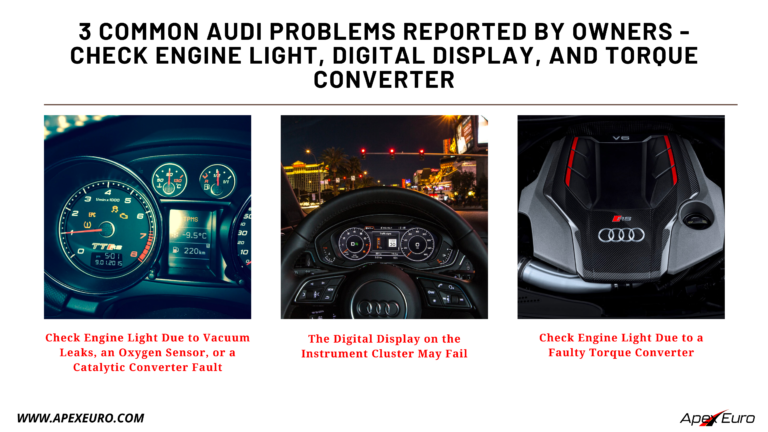Audi vehicles are known for their luxurious design, superior performance, and advanced technology. However, like any other car, Audis are not immune to mechanical issues. In this article, we will explore three common problems reported by Audi owners that include the check engine light due to vacuum leaks, an oxygen sensor, or a catalytic converter fault, the digital display on the instrument cluster failing, and the check engine light due to a faulty torque converter. We will delve into each problem, providing detailed information, troubleshooting tips, and possible solutions. So let’s dive in and learn more about these issues that can affect Audi owners.

The check engine light is one of the most common warning indicators that can illuminate on your Audi’s dashboard. It serves as a signal that there is a problem with your vehicle’s engine or emissions system. Some of the main causes for the check engine light to come on in an Audi include vacuum leaks, a malfunctioning oxygen sensor, or a faulty catalytic converter.
Vacuum leaks occur when there is an unintended gap or hole in the vacuum system of your Audi. These leaks can disrupt the air-to-fuel ratio, leading to engine performance issues and triggering the check engine light. Common symptoms of vacuum leaks include rough idling, decreased fuel efficiency, and reduced power.
The oxygen sensor plays a crucial role in monitoring the oxygen levels in the exhaust gases. When the oxygen sensor malfunctions, it can send incorrect signals to the engine control unit, causing the check engine light to activate. In some cases, a faulty oxygen sensor can also lead to poor fuel economy and increased emissions.
The catalytic converter is responsible for reducing harmful emissions by converting them into less harmful substances. If the catalytic converter fails or becomes clogged, it can trigger the check engine light. Signs of a faulty catalytic converter include a decrease in engine performance, a sulfur-like smell, and a reduction in fuel efficiency.
Another problem reported by Audi owners is the failure of the digital display on the instrument cluster. The instrument cluster is a vital component of your Audi’s dashboard, providing important information such as speed, fuel level, and warning messages. When the digital display fails, it can be frustrating and hinder your ability to monitor essential vehicle data.
There are several potential causes for the digital display failure:
If you experience a failure of the digital display on your Audi’s instrument cluster, it is recommended to consult with a qualified Audi technician who can diagnose the issue and suggest the appropriate solution.
The torque converter is a critical component of the automatic transmission system in Audi vehicles. It transfers power from the engine to the transmission and allows for smooth gear shifts. When the torque converter malfunctions, it can trigger the check engine light and lead to various performance issues.
If you notice any of these symptoms along with the check engine light, it is crucial to have your Audi inspected by a qualified technician. They will be able to diagnose the exact cause of the issue and recommend the necessary repairs.
Owning an Audi comes with the pleasure of driving a high-quality luxury vehicle. However, it is important to be aware of potential problems that can arise. The check engine light due to vacuum leaks, an oxygen sensor, or a catalytic converter fault, the failure of the digital display on the instrument cluster, and the check engine light due to a faulty torque converter are three common issues reported by Audi owners.
If you encounter any of these problems, it is recommended to seek professional assistance from a certified Audi technician who can diagnose and resolve the issues. By addressing these problems promptly, you can ensure the continued performance, reliability, and enjoyment of your Audi for years to come.